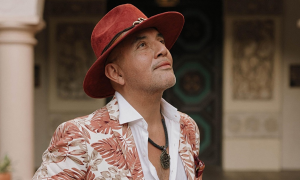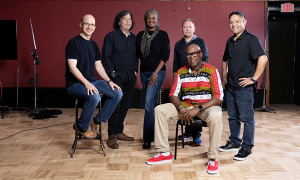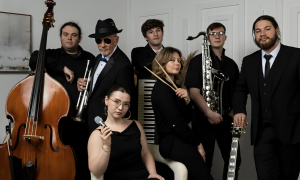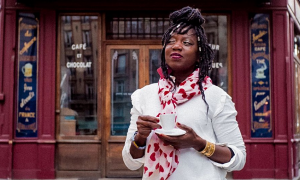Home » Jazz Articles » Take Five With... » Take Five with Tobin Mueller
Take Five with Tobin Mueller

Tobin Mueller
pianob.1955

Ron Carter
bassb.1937

Donny McCaslin
saxophone, tenorb.1966
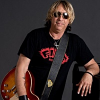
Paul Nelson
guitar
Ken Schaphorst
composer / conductorb.1960

Herbie Hancock
pianob.1940

Chick Corea
piano1941 - 2021

Stevie Wonder
vocalsb.1950

John Coltrane
saxophone1926 - 1967

Frank Zappa
guitar, electric1940 - 1993

Weather Report
band / ensemble / orchestra
Tower of Power
band / ensemble / orchestrab.1968
Instruments:
Piano, B3 organ, Wurlitzer/Rhodes electric pianos, MOOG, Trilian basses.Teachers and/or influences?
At an early age, I played with
Maynard Ferguson
trumpet1928 - 2006

Dave Brubeck
piano1920 - 2012

Bill Evans
piano1929 - 1980

Thelonious Monk
piano1917 - 1982

Chick Corea
piano1941 - 2021

Jimmy Smith
organ, Hammond B31925 - 2005

Stan Kenton
piano1911 - 1979

Charles Mingus
bass, acoustic1922 - 1979

Gerald Clayton
piano
Tigran Hamasyan
pianoI knew I wanted to be a musician when...
I was groomed to be a composer/musician by my mother. I grew up in a musical family. My mother would arrange 4-part harmony pieces for the entire family to sing, I was the youngest and usually sang the alto part. Each of the 3 siblings specialized in specific instruments; mine was originally the saxophone. My maternal grandfather was a violinist for silent films, lost his job when talkies came in, and never really found a steady job after that (common depression era story). But he always wanted to play. He composed a birthday tribute for everyone he knew, performing them on the banjo. He was a very quiet man full of meaning and melancholy. My mother wanted me to take up his dream of making music. She was a jazz singer (40s Swing Era jazz). I began accompanying her by the time I was 14 (late 1960s), then helped arrange her music when I hit high school age. I wanted to be a composer before I wanted to be a musician. I wrote my first symphony, performed by Lawrence University (Appleton WI) when I was 17. I continued writing music during my 30-year Broadway career, which lasted to 2005. It was then, as a 50 year old, my wife said to me one night, "You should record your piano music. Forget producers, NYC. Just record the music you play for me each night." That's when I started to consider myself a musician first (as opposed to a composer/arranger/playwright).Your sound and approach to music:
There is a huge divide in my styles: how I play solo piano vs. when I lead a jazz or prog-rock fusion ensemble. Writing songs for Broadway requires yet another set of skills. My sound has remained fairly consistent throughout my career, even though my approach has changed drastically. I used to analyze everything I wrote. Now I let my subconscious pull me forward, let my hands lead the way. I nearly always have a visual-emotional story to tell with each piece, something that imbues the music with an emotional narrative. I play piano like
Fred Hersch
pianob.1955

Brad Mehldau
pianob.1970
Your teaching approach:
Most of my teaching experience has been associated with being a Musical Director for my own Off Broadway shows: teaching singing techniques & interpretive styles. I don't teach anyone how to play or how to compose. I hope my music does that on its own. I did teach piano during my college years, but never asked for payment. I asked for bakery instead. You can never have enough chocolate chip cookies or cheesecake.Your dream band:
I build a new band for every record. So my ideal band would include those people I trust, that I can communicate with intuitively: Paul Nelson on guitar, Woody Mankowski on sax,
Tom Harrell
trumpetb.1946

Ron Carter
bassb.1937

Thelonious Monk
piano1917 - 1982

Max Roach
drums1925 - 2007

Charles Mingus
bass, acoustic1922 - 1979

Michael Brecker
saxophone, tenor1949 - 2007

Fats Navarro
trumpet1923 - 1950

Woody Herman
band / ensemble / orchestra1913 - 1987

Frank Zappa
guitar, electric1940 - 1993

Joe Zawinul
keyboards1932 - 2007
Road story: Your best or worst experience:
As my health started failing, carrying heavy keyboards and sound equipment remains my worst memory. I disliked starting a gig drenched in sweat. Can't tell you how often I felt I was getting sick during sound checks... until the adrenalin kicked in. There was also this one time I actually wept while I was performing, which I thought (self-consciously at the time) was kind of cool, tears running down my cheeks until my nose started running... The spotlights picked up this stream of mucus over a foot long. Embarrassing.Favorite venue:
Le Bar Bat, West 57th St., New York City. Late 1990s to early 2000s. They specialized in funk fusion jazz, had a great open vibe, and drew bandmates from
Tower of Power
band / ensemble / orchestrab.1968

Earth, Wind & Fire
band / ensemble / orchestraYour favorite recording in your discography and why?
Gosh, it's hard to pick a favorite. Isn't the latest one supposed to be? Without question, Prestidigitation is my best studio ensemble recording, both from a detailed arranging perspective, performance level, vitality, production. Yet, I have friends who keep going back to "Come In Funky" (featuring
Ron Carter
bassb.1937
The first Jazz album I bought was:
Bird & Diz by
Charlie Parker
saxophone, alto1920 - 1955

Dizzy Gillespie
trumpet1917 - 1993

Keith Jarrett
pianob.1945

Dewey Redman
saxophone, tenorb.1931

Charlie Haden
bass, acoustic1937 - 2014

Paul Motian
drums1931 - 2011

Return to Forever
band / ensemble / orchestra
Weather Report
band / ensemble / orchestraWhat do you think is the most important thing you are contributing musically?
I combine many genres in my music on purpose, not just because I enjoy so many different styles. I like to think that this synthesis is a statement on how we pull inspiration from countless places, countless people, countless eras, throughout our lives. Technically, I like to present chord progressions that have never been used before, which I hope inspire others. I love to capture a sense of play, but not merely as a diversion; as a way to uncover new perspectives. I play myself into corners and try to find a way out, gracefully. Restless key changes somehow equal meaningfulness to me. I try to balance tempo, progressions, harmonies, melody and countermelodies in such a way as to induce discovery. Both for me and the listener. The result is very dense, multi-layered music.Did you know...
I suffer from A1AD, autoimmune disorders, cancer and a few other health issues. I've stepped away from stress, which means I stopped performing live and moved out of Manhattan. Stopped writing theatre. Now I am merely a studio musician. In fact, "Prestidigitation" may be my last studio recording. (One of the reasons I'm glad it turned out so well.) I was very involved in the global environmental movement in the 1980s and early '90s. I worked with the United Nations, UNEP and several worldwide youth organizations. I wrote the theme song to UNEP's global Summit and toured an environmental musical around the world. I was inducted into the UN's Global 500 Roll of Honor in 1994. On a personal note, I have four grown kids, three grandkids with one on the way. Life goes on...Albums you are listening to now:
In preparation for Prestidigitation, I began listening to all the music from the fusion era. I'm still listening. Plus:
Cory Wong
guitarb.1985

Snarky Puppy
band / ensemble / orchestraDesert Island picks:
Box sets are cheating, right?
Bill Evans
piano1929 - 1980

Miles Davis
trumpet1926 - 1991

Brad Mehldau
pianob.1970
Frederick Chopin: Chopin Complete Edition (Deutsche Grammophon)

Joni Mitchell
vocalsb.1943
How would you describe the state of jazz today?
Jazz is fabulous. The players are phenomenal. Recording techniques are the best ever. There is no longer any need to stay in an era or a style, to be pure this or that. Total freedom, reverence for the old, enjoyment of the new. I just wish the audience was bigger... !What are some of the essential requirements to keep jazz alive and growing?
Teach it in schools. Have every school offer jazz band. Let students rent instruments for free, or rent to buy. Radio needs to offer more NEW jazz. We need more DJs, more crossover jazz offerings, more internet streams, etc.What is in the near future?
For me? Staying alive is Job One. The will be the first time in my entire career when I will take time to actually promote an album. In the past, I was already writing my next stage play before the casting was done with the last one. I was already composing or arranging my next record before the last one was mastered. Since this may be my last studio recording, I am not starting my next project until next year. I'm spending all this year promoting "Prestidigitation." I still love every track. I listen to it all the time. I am working with radio, print, you name it, to get it out there. Plus, guitarist Paul Nelson agrees it is the best guitar he has ever recorded—in his long career. We both are working to promote the album. Next year, I plan on remastering a 5-volume "Best Of" series of my studio recordings. After that, a 3-volume "Best Of" collection of my piano work. I may rerecord a few tracks.What's your greatest fear when you perform?
That my lung will collapse. That I'll start coughing uncontrollably. That my wrist will give out. (All these things have happened.)What song would you like played at your funeral?
Back when I first found out how sick I was, I recorded an album of me singing tunes for my own funeral. "Song of Myself." If I had to pick one: "Impossible Dream (from Man of La Mancha)." (FYI: I have lived two years longer than the doctors guessed, so I'm pretty pleased, so far.)What is your favorite song to whistle or sing in the shower?
I never sing in the shower. I love the feel of the water on my skin. In the shower, I live in the moment. All my worries wash away. It's restorative, almost redemptive. I don't let ghosts in the shower with me.By Day:
I was a playwright for 30 years. I've been a studio musician since. Composer/arranger. Although for three years back in 1980 I was a private detective. We had a son, unexpectedly, and I needed a steady income. Then I got an agent and things turned around. I supplemented things by writing reviews of keyboard gear, and software, helped create two video games, did ad stuff, and learned web design.If I weren't a jazz musician, I would be a:
I actually finished school in physics. I started in the Music School, but decided along the way, in youthful arrogance, that I didn't need teachers. Switched to physics and learned German, to better understand Einstein, etc. But then jazz and the theatre called... So, maybe a physicist? Or maybe an English professor?If I could have dinner with anyone from history, who would it be and why?
Frederick ChopinHow was recording your latest album different than previous efforts?
Each track for Prestidigitation was arranged and initially recorded by me using MIDI at the computer. I played all the parts, leaving room for solos when desired, using multi-tracked keyboards, bass, MIDI drums, etc. After getting good recordings of each, I sent them around to the players. Under the producing acumen of Kenny Cash, Factory Underground Studios, the drummer was brought in next to replace my MIDI drums, often times without the aid of a click track. (We had to time-fix a bunch of hits because of this, but at least the music breathes.) The backing band, horns and reeds, were then added, usually requiring several overdubs, creating the illusion of a large ensemble. Then the soloists recorded, often changing the arrangement further. No charts. No one played together. Everyone played separately, overdubbing the draft bed, one at a time. We thought it would save time, make for better audio, make mixing easier, and give us more freedom on the production side. The last two things were true, but, man, it was NOT faster! So much editing, moving around, and remixing was required. I had to replay a ton, because the hits, emphasis, other solos, etc., dictated different parts. But I think the end result WAS better. The interplay between me, Kenny Cash, and the other musicians recording separately, more slowly, enabled us to build each track in a step-by-step process that made each tune special. A far cry from projects like "What Survives," where everyone played together in a single large room separated by glass partitions from charts and scores. Progress, right?Tags
Take Five With...
Tobin Mueller
AAJ Staff
Ron Carter
Donny McCaslin
Paul Nelson
Ken Schaphorst
Herbie Hancock
Chick Corea
Stevie Wonder
John Coltrane
Frank Zappa
Weather Report
Tower of Power
Maynard Ferguson
Dave Brubeck
Bill Evans
Thelonious Monk
Jimmy Smith
Stan Kenton
Charles Mingus
Gerald Clayton
Tigran Hamasyan
Tom Harrell
Max Roach
Michael Brecker
Fats Navarro
Woody Herman
Joe Zawinul
Earth Wind & Fire
Charlie Parker
Dizzy Gillespie
Keith Jarrett
Dewey Redman
Charlie Haden
Paul Motian
Return To Forever
Cory Wong
Snarky Puppy
Miles Davis
brad mehldau
Joni Mitchell
Comments
PREVIOUS / NEXT
Support All About Jazz
 All About Jazz has been a pillar of jazz since 1995, championing it as an art form and, more importantly, supporting the musicians who make it. Our enduring commitment has made "AAJ" one of the most culturally important websites of its kind, read by hundreds of thousands of fans, musicians and industry figures every month.
All About Jazz has been a pillar of jazz since 1995, championing it as an art form and, more importantly, supporting the musicians who make it. Our enduring commitment has made "AAJ" one of the most culturally important websites of its kind, read by hundreds of thousands of fans, musicians and industry figures every month.




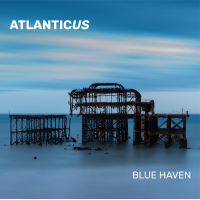

 Buy Now
Buy Now






